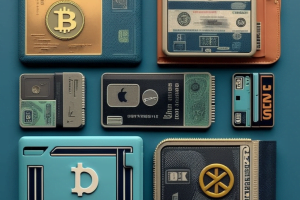Cryptocurrency wallets are essential tools for managing and securing digital assets. They allow users to store, send, and receive cryptocurrencies while maintaining control over their private keys. In this ultimate guide, we will explore the different types of cryptocurrency wallets, their features, security measures, and best practices for managing your digital assets.
Types of Cryptocurrency Wallets:
- Hardware Wallets: These are physical devices that store your private keys offline, providing an extra layer of security. Examples include Ledger Nano S, Trezor, and KeepKey. Hardware wallets are ideal for long-term storage of large amounts of cryptocurrencies.
- Desktop Wallets: Desktop wallets are software applications installed on your computer. They provide a good balance between security and convenience. Examples include Electrum, Exodus, and Bitcoin Core. Remember to keep your computer secure and updated to protect your wallet from hacks and malware.
- Mobile Wallets: Mobile wallets are smartphone apps that allow you to manage your cryptocurrencies on the go. They are convenient for everyday use and small transactions. Examples include Mycelium, Jaxx, and Coinomi. Always download wallet apps from trusted sources to avoid scams and malware.
- Web Wallets: Web wallets are accessed through your internet browser and are considered less secure due to their online nature. They are prone to phishing attacks and hacks. Examples include MyEtherWallet, MetaMask, and Blockchain.com. Use web wallets for small amounts and short-term storage only.
- Paper Wallets: Paper wallets are physical printouts of your private and public keys. They are considered secure for long-term storage, as long as they are kept safe from damage, loss, or theft. Remember to create multiple copies and store them in different secure locations.
Security Measures and Best Practices:
- Backup your wallet: Regularly backup your wallet to ensure you can recover your funds in case of device failure or loss.
- Enable two-factor authentication (2FA): Use 2FA for added security on your wallet, especially for web and mobile wallets.
- Keep your private keys safe: Never share your private keys with anyone and store them securely to prevent unauthorized access to your wallet.
- Update wallet software: Regularly update your wallet software to the latest version to ensure maximum security and bug fixes.
- Beware of phishing attacks: Be cautious of fake wallet websites, apps, and emails that attempt to steal your login credentials or private keys.
Conclusion: Understanding cryptocurrency wallets is crucial for safely managing your digital assets. By exploring the various wallet types and following security best practices, you can minimize the risk of loss and maximize the potential of your cryptocurrency investments. As the world of cryptocurrencies continues to evolve, staying informed and vigilant is the key to safeguarding your digital wealth.























